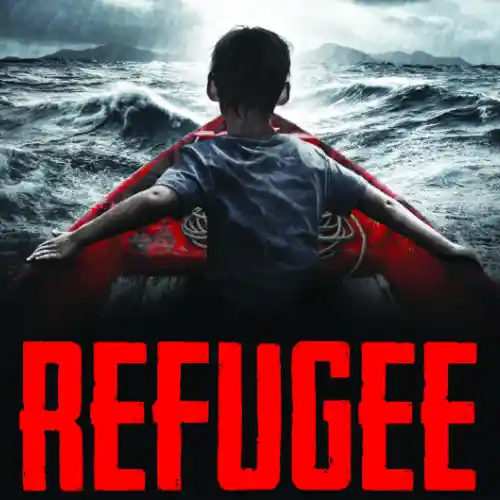Isabel’s mother cried out. “It’s coming— it’s coming!”
Isabel didn’t know if she meant the baby, or the Coast Guard ship.
Or both.
“Paddle!” Amara cried.
Isabel paddled harder. She could see the shore, could see the beach umbrellas folded up for the night but still stuck in the sand. Strings of lights. Palm trees. More music—a salsa now. It was all so close!
But so was the Coast Guard ship. It bore down on them, its red light flashing, its powerful motor thrumming, water sluicing from its bow.
Isabel’s heart hammered. It was going to catch them. They weren’t going to make it!
Lito froze. “It’s happening again,” he said.
“What? What do you mean?” Isabel asked, panting.
“When I was a young man, I was a policeman,” Lito said, his eyes wild.
“There was a ship—a ship full of Jews, from Europe. And we sent them back. I sent them back! Sent them back to die when we could so easily have
taken them in! It was all politics, but they were people. Real people. I met them. I knew them by name.”
“I don’t understand,” Isabel said. What did her grandfather’s story have to do with anything?
“Paddle!” Isabel’s father cried. The Coast Guard boat was almost on top of them.
“Don’t you see?” Lito said. “The Jewish people on the ship were seeking asylum, just like us. They needed a place to hide from Hitler. From the Nazis. Mañana, we told them. We’ll let you in mañana. But we never did.”
Lito was crying now, distraught. “We sent them back to Europe and Hitler and the Holocaust. Back to their deaths. How many of them died because we turned them away? Because I was just doing my job?”
Isabel didn’t know what ship her grandfather was talking about, but she knew about the Holocaust from school. The millions of European Jews who had been murdered by the Nazis. And now her grandfather was saying that a ship full of Jewish refugees had come to Cuba when he was a young man?
That he had helped to send them away?
Mañana. Suddenly, Isabel understood why her grandfather had been whispering that word over and over again for days. Why it haunted him.
When would the Jews be let into Cuba? Mañana.
When would their boat reach America? Mañana.
Mañana had never come for the Jewish people on that ship, Isabel realized. Would mañana never come for Isabel and her family either?
A calm came over Lito, as though he’d come to some sort of understanding, some decision. “I see it now, Chabela. All of it. The past, the present, the future. All my life, I kept waiting for things to get better. For the bright promise of mañana. But a funny thing happened while I was waiting for the world to change, Chabela: It didn’t. Because I didn’t change
it. I’m not going to make the same mistake twice. Take care of your mother
and baby brother for me.”
“Lito, what are you—?”
“Don’t stop rowing for shore!” Isabel’s grandfather yelled to everyone else. He kissed Isabel on the cheek, surprising her, and then stood and
jumped into the ocean.
“Lito!” Isabel cried. “Lito!”
“Papá!” Isabel’s mother cried. “What’s he doing?”
Isabel’s grandfather popped back up a few meters away, his head appearing and disappearing in the waves.
“Lito!” Isabel cried.
“Help!” he cried, waving his arms at the Coast Guard ship while at the same time swimming away from it. “Help me!” he yelled.
“He jumped in to distract them!” Papi realized.
“They’ll come for us first!” Señor Castillo said.
“No, he’s in danger of drowning. They have to rescue him!” Amara cried. “This is our chance. Row—row!”
Tears rolled down Isabel’s cheek where her grandfather had just kissed her good-bye. “Lito!” she cried again, reaching out for him over the waves.
“Don’t worry about me, Chabela! If there’s one thing I’m good at, it’s treading water,” Lito yelled back. “Now, row! Mañana is yours, my beautiful songbird. Go to Miami and be free!”
Isabel sobbed. She couldn’t paddle. Couldn’t row. Couldn’t do anything but watch as the Coast Guard ship veered away from their little boat and steered toward her grandfather. Went to save him and send him to Guantanamo. Back to Cuba.

